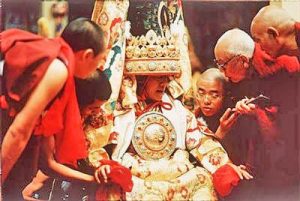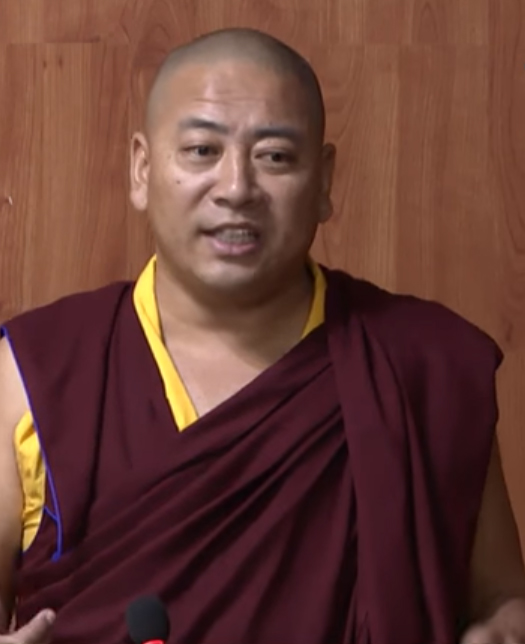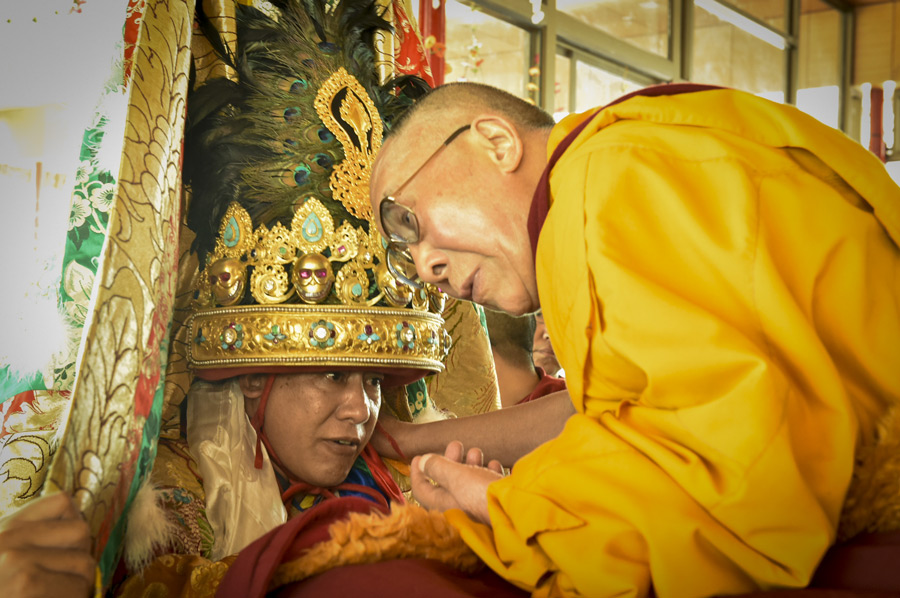Forever touting themselves to be a fledgling democracy, the Central Tibetan Administration (CTA) enjoys insisting that they do everything they can to match the principles and ideals of a democratic state. Yet upon further examination of the evidence, this could not be further from the truth.
Most recently, the Tibetan Prime Ministerial elections was rocked by allegations of vote rigging and the use of underhanded tactics to squeeze out unwanted rivals. This was enforced by the Election Commission, a body supposedly tasked with overseeing the fairness and transparency of the elections. However, a much more pervasive and sinister abuse of democracy has been practised by the Tibetan administration for decades now, with no one questioning why it has been allowed to go on for so long.
This of course, is in reference to the CTA’s reliance on Nechung as the State Oracle, something which is finally being questioned by members of the CTA themselves.

The Tibetan leadership has for decades now devolved responsibility for their decision-making to the gods.
The CTA is the only ‘democratic’ administration in the world that regularly and unmistakably conflates church and state. Where other true democratic nations make an effort to separate the two, the CTA is unashamed and unabashed in mixing religion with politics. No other ‘democratic’ nation in the world relies on the gods and unseen beings to make their decisions. In this video below, you will see Member of Tibetan Parliament (MP; Tib.: chithue) Tenpa Yarphel questioning Nechung’s role in their governance and leadership.
Tenpa Yarphel questions why there is a need to do this when historically, the leadership’s experiences with Nechung have not been consistently positive nor constructive. He even references the occasion when Nechung is said to have prescribed the wrong medication to the 13th Dalai Lama, leading to his premature death.
He also cites the example of the Panchen Lama issue to demonstrate how ineffective it has been for them to rely on Nechung. For all the faith the Tibetan leadership has invested in this deity, Tenpa Yarphel states clearly that nothing tangible nor positive has come out of it. Consider the furore over the disappearance of the ‘real’ Panchen Lama. Tenpa Yarphel wonders out loud why the Tibetan leadership have not questioned Nechung as to the ‘real’ Panchen Lama’s whereabouts, when the CTA claims that his disappearance is a serious human rights issue and they have provoked supporters of the Tibetan cause to champion and highlight this issue.

Tenpa Yarphel strongly questioned the Tibetan leadership’s unquestioning reliance on Nechung
Tenpa Yarphel also questions why the administration continues to rely on an oracle when, if the oracle and deity could not or refused to give an answer, that man would be perfectly capable of making decisions for himself. In fact, why even have an oracle, if man is good enough?
So while the CTA claims to be a government led by Buddhist principles, Tenpa Yarphel wonders if this is really fair, considering the variety of faiths and beliefs held by Tibetans. Is it fair to impose one religion’s principles and traditions on a populace who may not necessarily subscribe to those beliefs? What about Muslim Tibetans and Christian Tibetans who deserve to be led by a true democracy, instead of a leadership that resigns its decision-making abilities to gods they do not believe in?
MP Tenpa Yarphel’s tone is that of doubt, intimating that he does not agree with the reliance on Nechung. It should be remembered that it was the Dalai Lama who has encouraged the reliance of Nechung as a State Oracle. In questioning the validity of Nechung, Tenpa Yarphel is indirectly questioning His Holiness the Dalai Lama since it was the Dalai Lama who chose to give Nechung so much precedence and influence in the modern day. It is indeed brave of Tenpa Yarphel to openly doubt the Dalai Lama’s choice and decision. As we have seen with Dorje Shugden practitioners in the past, merely questioning the Dalai Lama’s illogical ban on Dorje Shugden will earn you the label of ‘traitor’, a spot on some kind of hit list or another, and the reputation of someone deserving of violence and vulgarities.
Tenpa Yarphel similarly intimated that he doubts the trances, and even questions their authenticity and validity. As a member of the Tibetan leadership, it has to be asked why he and everyone else goes along with it when they are fully functioning, cognizant and hopefully logical adults. Their unquestioning and unrelenting reliance on an unseen being for make democratic decisions is superstitious at best, and irresponsible and dangerous at the worst.

His Holiness the Dalai Lama has a close relationship with the Nechung Oracle. Some might claim this follows in Buddhist traditions but other Buddhist nations do not exhibit such a heavy reliance on deities. This has allowed them to develop a more effective style of governance with truly egalitarian leadership opportunities for the people
While the CTA might argue that their reliance on Nechung is in keeping with their Buddhist traditions, we would posit that other Buddhist nations have faith in the gods yet do not mix religion and politics to such a degree where the leaders are rendered ineffectual and impotent. In fact, these other Buddhist governments exhibit a far more complex and well-developed style of governance that has resulted in prosperity and peace for their country and people. Bhutan for example, does not rely on oracles but their government continues to go from strength to strength while the Tibetan leadership struggles to provide for their people even after 60 years in exile. So why are the Tibetan leadership relying on oracles they KNOW to be unreliable, to make state decisions? The Tibetan people should really question their faith and trust in their leadership, when it is their leadership who relies on beings that cannot be trusted.
There is now growing social media chatter about how the decades of trouble for Dorje Shugden will soon be shifted in Nechung’s direction, now that people are seeing how problematic it has become for them to rely on an unenlightened spirit for state-level decision-making. Whether or not this chatter will develop into action remains to be seen, as the Tibetan leadership become increasingly aware of their people’s dissatisfaction towards their decision-making style. What is unmistaken however, is that Tibetan society is finally waking up to the decades of abuse, exploitation and neglect they have suffered under a leadership who, instead of taking responsibility for their people, has divested it in unseen, unenlightened beings. It is a society that is frustrated and fed up and ready for change, and it is about time the Tibetan leadership wakes up to this before they have lost all control and it is too late.
Tenpa Yarphel Questions Nechung
Translation: Part 1
From the Department of Religion & Culture, today they have been talking about tradition of trance, the reason for taking trance, oracles, etc. Today, the Head of the Department of Religion & Culture said the reason why we rely on oracles and trance is because our government is based on both religion and politics, that is why we hold trances.
One of the venerable MPs [name unintelligible] has just spoken about the story of Nechung and stated that Nechung has benefited religion and politics. After collecting all the information, since from before, I used to have doubt how the trances take place.
If I see all the stories, then not much good has happened. I’m not that much of an expert on that kind of story.
There are some stories that, not specific to the Nechung Kuten or to the Dalai Lama, but there are stories where Nechung Kuten has given the wrong medicine. By giving the wrong medicine, the Dalai Lama died. So there are these kinds of stories also.
We should separate the origination stories of Nechung as a protector and taking trance in an oracle, and the lineage of the Nechung oracle himself. By mixing both, for self-use, we cannot do these kinds of things. These kinds of stories also exist.
According to the records of previous government proceedings, there has also been a mention that Nechung is recognised as the government’s oracle.
Secondly, I have the thought or opinion that actually, what is the meaning of a ‘government oracle’? Does it mean that the Nechung Oracle has existed since the time Gaden Phodrang was the Government of Tibet? Is this the real government oracle? Or after the Tibetan government in exile, was it recognised as the government oracle then? Or was it after they became an administration that it was recognised as the government oracle? I need these two things to be clarified.
There’s no need to know about Nechung or the Nechung Oracle. In my case, I don’t have a connection with this. Every religion has their own protector deity. Our government, just because we mix religion and politics, we need to take trance, it doesn’t make sense. If our government is a mix of religion and politics, and the religion part refers to a specific god or deity, you cannot apply one god to all religions.
Moreover, these days there is a lot of talk about trances and other people have a lot of opinions.
There have been trances for the purpose of the Dalai Lama’s well-being, yes we agree on this one. Even if the oracle didn’t give answers, we can do it by ourselves.
We know about collective merit, and we know how to accumulate collective merit even if the god doesn’t tell us. In the Buddhist scriptures, there is mention about cause and effect. It’s also mentioned very clearly in the Buddhist scriptures how to accumulate merit.
If by holding the trances and oracles makes any difference, it’s been a long time since we have heard about the Panchen Rinpoche. Is there any possibility of holding a trance for this matter? Until now there has been any trance or not? If there has not been any trance, then why has it not been held? Alive or not alive? Do they know about this condition? Now you can see the condition. Actually, isn’t this something that needs to be consulted? Indeed, maybe they [the deities] also know about all this.
One point is like that. And there is a custom of praising the oracle. Earlier I had questioned the Head of the Department of Religion & Culture about this but he did not have the correct answer. This is what I have to say!
Translation: Part 2
And there have been many stories / speeches about the Nechung Oracle, and I feel like it is very important to express my opinion also.
It is very weird. During the trance, they do not write [down what Nechung says] but only do it after the deity leaves the oracle’s body. It’s very surprising that man can understand god language. I doubt this very much.
In the letter*, there comes many things and I doubt it was actually told by Nechung. How can one understand the god language? It may make sense if it was written down during the trance then this would symbolise it is a real trance, but it doesn’t happen like this.
And we have discussed a lot about Nechung Oracle. If it is a deity accepted by all religious traditions then this is really not my concern. In my case, it’s really not my concern. This is the point.
We have talked about praising Nechung Oracle before. It was mentioned that he is higher than any other traditions’ teachers, that’s why we honour him. And also, the Treasurer of the Department of Religion and Culture praises him which means he is defined as higher [by them].
Praising [a] god as higher than teachers / masters is not accepted by our Buddhism. It’s not about great and small. But the Department of Religion and Culture praising any deity contradicts our Buddhism / or is against Buddhism.
Today there are no accounts mentioned [for what is offered to the oracle]. Still, it must be same? Last year, last year this has been brought up before. Previously, I have questioned this. This kind of situation is not acceptable. This is I want to say.
And it’s about funding for cultural activities which we have also discussed many times. Many have asked why we talk about cultural funding. Anyway, I am not the Chief for the Department of Religion and Culture but the question about this matter has been raised again and again. I think there must be reason for this. Last time, I asked two questions. One question asked if we are related in history, which is why we send funds to Mongolia [to preserve their culture].
Kalon is here. Another question asked if it is because we are related in religion and cultural background, so that is why we send funds to Mongolia.
We have many people in our society who are from the Himalayan region, Bhutan, etc. and also have the same religion and cultural base [as us]. They may feel that we live in the same house, with same rules, we eat together. Yet one side [Mongolians] receive funding from the Tibetan government and the other part, nothing. Also, on this matter, the answer was not clear.
Today, what is spoken about is what cultural education is. Is it because a of government-to-government relationship? So, this government relationship is either related via religion or politics.
If it is by religion then from which religious tradition is it related? Earlier, the Religion and Culture Kalon said, “Khenpo (Abbot) is nothing.” He doesn’t do anything remarkable. Remarkable or not, it is not about great and small [positon]. It’s because it [the funding] is given by the Treasury of the Tibetan government. Whatever aim, needs and reason [given for this funding], the doubts are getting bigger and bigger. They are not being cleared. This is what I want to say.
And another question: Members of Parliament had talked about providing assistance / resources to Gedunpas [monks]. This is very important. All deities and protectors teach how to accumulate collective karma. Accumulating merits actually arises from the sangha’s place**. Our Buddhist scriptures teach that the main place to accumulate merit is the Gedunpa place. If you make requests to Gedunpa [for various activities like pujas, teachings, etc.] then not only will you accumulate collective karma, but you will also make a good relationship with the monasteries, and [they] can explain any topic just as said in our Tibetan proverb “killing two deer with one arrow”.
Like this it’s true. If you give necessary help to the Sangha then we accumulate collective merit, exactly. Nothing is better than this.
In refugee camps, all the old people are gathered for prayer. If they [the old people] don’t come then they are fined, [they are] doing like this. Instead, there are many Gedunpas’ places that can help them [to do the prayers]. If you give them assistance and medical help then you automatically accumulate collective merit. Please think carefully about this. Actually I am talking for a better outcome. If my talk is not for a better outcome, then anyone can talk big like this. If you keep talking nonsense then it will be like not taking responsibility. This is what I want to say.
And now about geshema. For geshemas, the Department of Religion and Culture is providing finance, holding exams for them, providing necessities, we really admire this. This is the consideration of the Dalai Lama and we rejoice. All religious traditions included, along with Bon, also have very qualified nuns. So they also need equal treatment.
MORE NEWS LIKE THIS